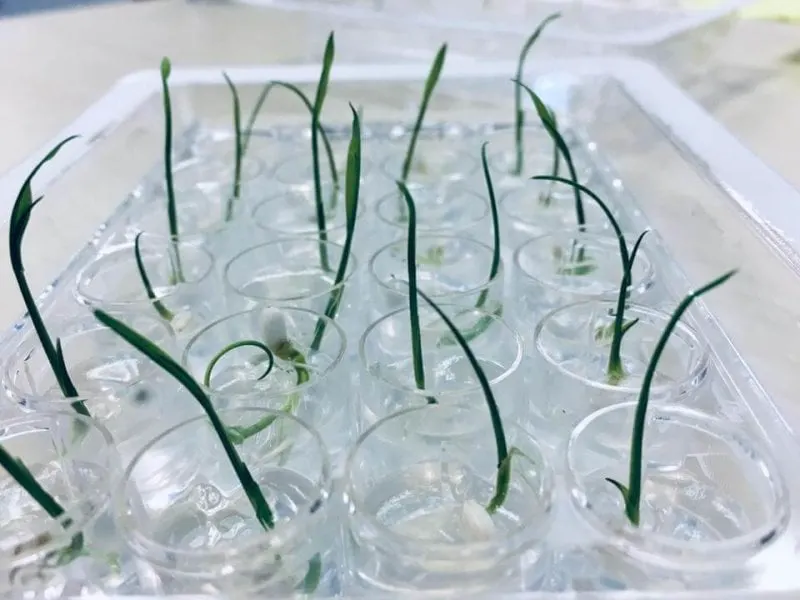Engineering rice plant roots increases crop yields in salty soil, study shows
Engineering rice plant roots increases crop yields in salty soil, study shows


Genetically improving the root system architectures of plants is an effective strategy for developing climate-resilient crops. In this study, we revealed that a cloned rice quantitative trait locus associated with root growth angle, qSOR1, is a DRO1 homolog involved in root gravitropic responses.
The loss-of-function allele qsor1 resulted in roots that developed on the soil surface and enabled plants to avoid the reducing stress found in saline paddy soils and, consequently, increased yields. We show that the DRO1 homologs could be useful for the controlled breeding of root system architectures that are adapted to the abiotic stress conditions caused by global climate change.
The root system architecture (RSA) of crops can affect their production, particularly in abiotic stress conditions, such as with drought, waterlogging, and salinity. Salinity is a growing problem worldwide that negatively impacts on crop productivity, and it is believed that yields could be improved if RSAs that enabled plants to avoid saline conditions were identified.
…
In saline paddies, near-isogenic lines carrying the qSOR1 loss-of-function allele had soil-surface roots (SOR) that enabled rice to avoid the reducing stresses of saline soils, resulting in increased yields compared to the parental cultivars without SOR. Our findings suggest that DRO1 homologs are valuable targets for RSA breeding and could lead to improved rice production in environments characterized by abiotic stress.
Read the original post

 | Videos | More... |

Video: Nuclear energy will destroy us? Global warming is an existential threat? Chemicals are massacring bees? Donate to the Green Industrial Complex!
 | Bees & Pollinators | More... |

GLP podcast: Science journalism is a mess. Here’s how to fix it

Mosquito massacre: Can we safely tackle malaria with a CRISPR gene drive?

Are we facing an ‘Insect Apocalypse’ caused by ‘intensive, industrial’ farming and agricultural chemicals? The media say yes; Science says ‘no’
 | Infographics | More... |

Infographic: Global regulatory and health research agencies on whether glyphosate causes cancer
 | GMO FAQs | More... |

Why is there controversy over GMO foods but not GMO drugs?

How are GMOs labeled around the world?

How does genetic engineering differ from conventional breeding?
 | GLP Profiles | More... |

Alex Jones: Right-wing conspiracy theorist stokes fear of GMOs, pesticides to sell ‘health supplements’




 California, Washington, Oregon forge immunization alliance to safeguard vaccine access against federal undermining
California, Washington, Oregon forge immunization alliance to safeguard vaccine access against federal undermining Trust issues: What happens when therapists use ChatGPT?
Trust issues: What happens when therapists use ChatGPT? Fighting deforestation with CO2: Biotechnology breakthrough creates sustainable palm oil alternative for cosmetics
Fighting deforestation with CO2: Biotechnology breakthrough creates sustainable palm oil alternative for cosmetics Viewpoint — Fact checking MAHA mythmakers: How wellness influencers and RFK, Jr. undermine American science and health
Viewpoint — Fact checking MAHA mythmakers: How wellness influencers and RFK, Jr. undermine American science and health 30-year-old tomato line shows genetic resistance to devastating virus
30-year-old tomato line shows genetic resistance to devastating virus Viewpoint: Video — Big Solar is gobbling up productive agricultural land and hurting farmers yet providing little energy or sustainabilty gains
Viewpoint: Video — Big Solar is gobbling up productive agricultural land and hurting farmers yet providing little energy or sustainabilty gains The free-range chicken dilemma: Better for birds, but with substantial costs
The free-range chicken dilemma: Better for birds, but with substantial costs ‘You have to treat the brain first’:Rethinking chronic pain with Sanjay Gupta
‘You have to treat the brain first’:Rethinking chronic pain with Sanjay Gupta
